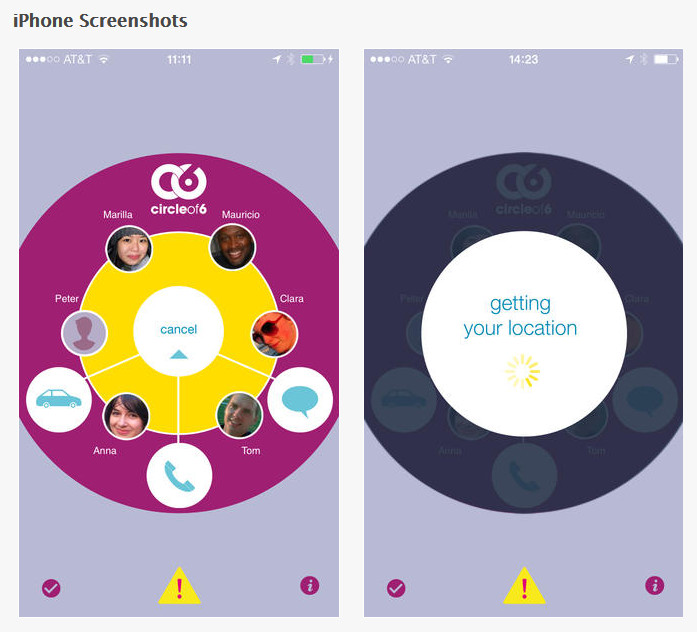Lorna M. Hartman, Spokane, WA, SSH Blog Correspondent
 Spokane is the second-largest city in Washington state by population, located in a mostly rural area in eastern Washington. Despite its size, to visitors and many residents, it still has a distinctly small-town feel.
Spokane is the second-largest city in Washington state by population, located in a mostly rural area in eastern Washington. Despite its size, to visitors and many residents, it still has a distinctly small-town feel.
Unfortunately, small town or not, street harassment has not passed us by. Fortunately, the discussion about street harassment has not passed us by either. The conversation has at least begun in the Spokane area.
On June 3 our local newspaper, The Spokesman-Review, re-posted a USA Today article by Jaleesa Jones titled “4 Free Apps That Could Help Prevent Sexual Assault.” While the article headline specifies “sexual assault” as a general topic, all four apps listed (bSafe, Circle of 6, Hollaback! and Guardly) were intended to be used as people go about their lives in public spaces—precisely where women suffer street harassment. These apps are useful to anyone out in public who feels unsafe.
The article referenced the recent tragedy of Elliott Rodger’s shootings and the #YesAllWomen hashtag. Jones wrote, “The amount [of] interest in the hashtag points to a blatant truth: Sexual assault and street harassment are far too common.”
Inlander is a local alternative weekly newspaper that publishes news and entertainment pieces for a large geographic area around Spokane. On May 29 it ran a story called “One of the billion tales that yes, all women, can tell about sexism” written by Taylor Weech, a local writer, photographer and radio host. Weech actually began writing her piece on street harassment before Rodger committed his murders, and she finished writing it after the news had spread.
Weech wrote before the shootings, “I felt a lot of pressure from past conversations to pre-empt the commenters in proving that street harassment is not flattering, that it is one of many disturbing expressions of male entitlement to sex and women’s bodies, and that it is part of a continuum of disrespect for female autonomy that too often culminates in severe or even deadly violence…”, citing the new Tumblr site “When Women Refuse.”
After the attacks, Weech wrote, “In an unfortunate twist of fate, the proof of that statement became the most visible news story of the weekend…”
Weech tells several of her own stories of harassment–#YesAllWomen have those stories to tell—and concludes with an appeal to teach our children differently for the sake of both girls and boys. One commenter in the thread of her article wrote of how sad it is that “it takes a man writing a hate-filled manifesto and then going on a killing spree to really make a conversation about this problem hit the mainstream.”
Rodger’s murders, while I give them no credit for anything good, have resulted in a more open discussion of what it’s like to walk around female in Spokane. It hasn’t always been a welcome discussion or a wanted topic—but now it’s out there and it isn’t going back. We will all be better for continually shining a light on it.
SRTC is Spokane County’s designated metropolitan transportation planning organization. The SRTC Transportation blog featured a piece on street harassment back in 2012 called “Website Aims to Stop Street Harassment” and described StopStreetHarassment.org. (I didn’t know SRTC was so plugged in!)
The writer, an unnamed female SRTC staffer, mentions a few of her own experiences with street harassment. She says of Spokane, “Besides being irritating and in some cases scary, street harassment limits people’s mobility and access to public spaces. It is a form of gender violence and makes our downtown and other areas less inviting and therefore less vibrant.” She’s right. People don’t realize how different downtown Spokane would be, particularly in the evenings, if no one ever had to worry about being harassed or followed. It’s an extensive problem, and Spokane unfortunately isn’t unique at all in facing this problem.
Spokane does, however, have the beginnings of action and conversation around street harassment. Even further back, in mid-2011, activists organized SlutWalk Spokane. SlutWalk, you might remember, started after a Toronto police officer participating in a law school campus safety session counseled female students that if they didn’t want to be sexually victimized, “Don’t dress like a slut.” The group’s Facebook page is still active today.
While the reality is still depressing, these lights shining publicly give me hope for the future.
Lorna is raising three young, kindhearted male allies and has worked on rape and interpersonal violence since the 1990s, including serving on the local rape hotline, answering calls, and driving to emergency rooms to advocate for victims and connect them with resources they needed.
